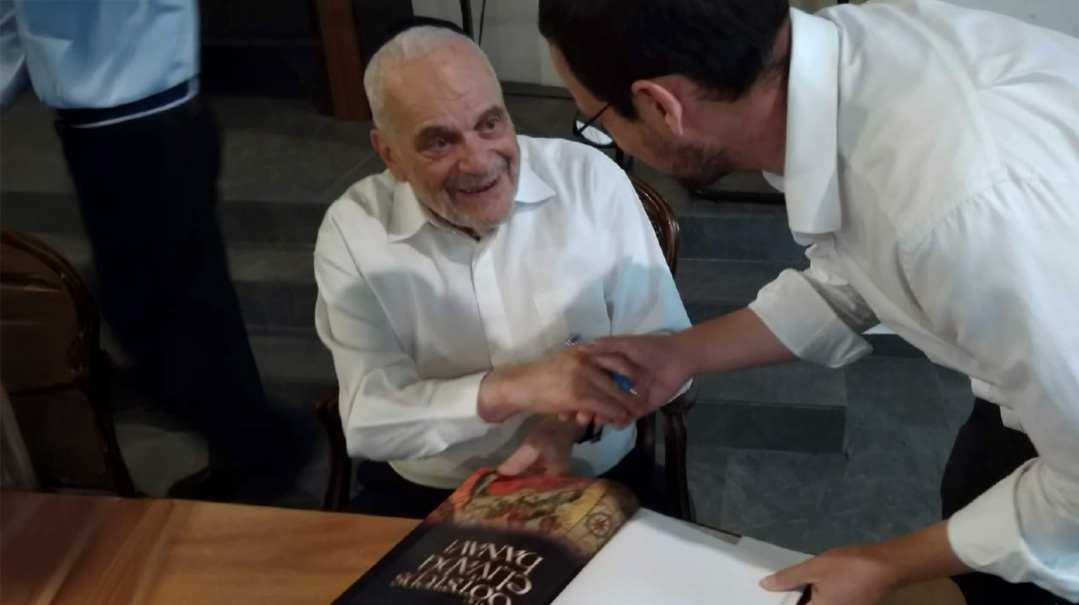The Story Is Torah

“Bubby managed to free herself of the shackles of Olam Hazeh. She was so refined, so selfless; a perfected individual”

A chapter ended Shabbos, parshas Matos-Masei, with the passing of Rebbetzin Reichel Berenbaum. It was a chapter seeped both in rich history and in the Torah world of today.
Rebbetzin Berenbaum was the daughter of Rav Avraham Kalmanowitz, a man known not only for his gaonus, but also for his involvement in the klal. Rav Kalmanowitz worked tirelessly to save his brothers and sisters living in Egypt, Syria, as well as those caught in the Nazi net. It was largely due to his efforts that the Mir yeshivah was able to find refuge first in Kobe, Japan and then in Shanghai, China.
He gave that sense of achrayus, that sense of family over to his children, and Reichel was no exception.
“My mother in law’s home was open to all sorts of people, from every walk of life,” shares her daughter-in-law. “She provided like a mother for the talmidim of the yeshivah, she was heavily involved in shidduchim, and she supported her husband’s Torah in every manner possible.”
Reichel Kalmanowitz married Rav Shmuel Berenbaum, a bochur from Mir, in the ’40s, and together, they built a spiritual palace. As Reb Shmuel ran the Mir yeshivah from the helm, Rebbetzin Reichel ran it from the offices, attending to the practical needs of the bochurim with precision.
One summer, the Rebbetzin went to visit one of her sons, a rebbi in a mesivta. The bochurim surrounded her, hungry for vignettes about Reb Shmuel.
“Tell us a story,” they begged. The Rebbetzin tried to deflect them, she wasn’t one for stories, and didn’t enjoy being the center of attention. But they were persistent, talmidim thirsty to drink from waters no longer available, and finally she conceded.
“The story is Torah,” she said, as they all leaned in. “The story is Torah.”
That was her life, her essence, her purpose: Torah.
Straight to Gan Eden
At her levayah, her brother Rav Yisrael Kalmanowitz said, “For three reasons, my sister won’t have to endure Gehinnom on her way to Gan Eden.”
And then he listed: One, her chesed. In particular, the chesed she showed to an almanah with no children, who had no one to care for her as she grew older. The Rebbetzin brought her into her home, fed her, took care of her medical needs, and treated her as family.
Two, her chashivus haTorah. So much more than one mitzvah, it was the defining essence of her life. Their small home in Brooklyn was the picture of simplicity, but the trappings didn’t matter to her.
The house had a front door and a side door. At times, when the Rav was learning in one of the front rooms, Rebbetzin Reichel would exit out of the side door and then reenter the home through the front door just to get to another room in the house, so she wouldn’t have to walk through the room he was learning in and disturb him.
And three, unfortunately, was her yissurim. Toward the end, she endured extreme pain, and was unable to be sedated for relief.
“For these three reasons,” he said, “she went straight to Gan Eden.”
At the end, it took tremendous effort for her to on and off the bed. One night, after she was finally settled, she grew agitated, realizing she’d forgotten to kiss the mezuzah.
“It’s alright,” her son consoled her. “It’s not a mitzvah or even a minhag.”
But Rebbetzin Berenbaum kissed the mezuzah upon entering and exiting a room. And tonight would be no different.
She was medakdek b’halachah, constantly striving to do ratzon Hashem. In the hospitals, she would take the effort to ask the doctors to ensure she was covered at all times.
Several years back, she’d often spend Shabbos with her daughter and son-in-law. They’d go pick her up from her home in Brooklyn on Friday and drive her to their home in Springfield. One Friday, due to traffic delays, shkiyah approached and they had to exit the car 20 minutes from the house and walk the remainder of the way in torrential rain. By the time they arrived, they were soaked to the skin and eager to change into warm, dry clothing.
But Rebbetzin Reichel just stood there, not moving, as everyone bustled around, eager to help. She wouldn’t dry off. She was too afraid she’d be over on the melachah of squeezing. She remained there until she was confident it would no longer be a problem.
A Human Malach
“At the levayah, we cried over the loss of our Bubby,” a great-granddaughter states, “but we also cried over the loss of something deeper. Not only did we lose our beloved mother, grandmother, great-grand mother, and great-great-grandmother, we also lost our link to the chashivus and gadlus of yesteryear, of the previous generation.”
She loyally supported her husband in his lifelong mission of ameilus b’Torah. It began as early on as the morning after their chasunah, when Reb Shmuel was found in the beis medrash. “Mein kallah hat mir geshikt — My kallah has sent me,” he explained to his astonished friends. And it continued throughout his life, as she encouraged and protected his total immersion in Torah in all situations.
“Bubby managed to free herself of the shackles of Olam Hazeh. She was so refined, so selfless; a perfected individual, to the point that we sometimes felt she was more malach than human.
“But truthfully, she was simultaneously more human than malach. Bubby was so relatable, so interested and involved in all the myriad details of our lives. Who can forget seeing ‘Berenbaum, Shmuel’ on the caller ID on Friday and thinking, Uh oh, Bubby beat me to it again! Next Friday, I’ll call her first, to wish her a good Shabbos!
“In Bubby we saw what a person can become and who a Yid truly is. It says that when a tzaddik is niftar, his maalos are ‘parchos baavir’ — they’re available for those who reach for them. Maybe, by reflecting on her life and learning from her special ways, we can integrate some of her greatness into our lives, and keep a little bit of Bubby Berenbaum inside all of us.”
(Originally featured in Family First, Issue 703)
Oops! We could not locate your form.







